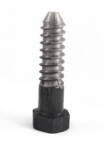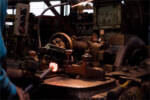Newest FAQs
Yes. Portland Bolt has in the past assembled mesh, and other, thread protectors onto anchor bolts and headed bolts to protect the threads during shipping. However, for large construction fasteners, it is exceedingly rare this is required or needed. Typically our sturdy packaging and shipping practices will be more than sufficient to ensure that the... Read more
The A153 specification has 4 classes of material for hot-dip galvanizing: A. Castings – Malleable Iron, Steel B. Rolled, pressed, and forged articles C. Fasteners over 3/8” in diameter, washers 3/16” to 1/4” thickness D. Fasteners 3/8” inch in diameter and under, washers under 3/16” thick F2329 was created out of A153 to further define the... Read more
Even with the new F3125 specification that covers A325, Portland Bolt would not manufacture lag screws to F3125 Grade A325. According to section 1.2.1 under Intended Use in ASTM F3125, “Bolts manufactured under this specification are intended for use in structural connections covered in the Specification Joints Using High-Strength Bolts, as approved by the Research... Read more

Unfortunately, Portland Bolt cannot manufacture fasteners with Unified National Fine threads. UNF thread series bolts are typically used in precision applications, such as automotive or machinery. Our threading equipment is unable to hold the required thread tolerance for UNF. Also, unlike cold-drawn steel, the hot rolled round bar we use to manufacture construction fasteners does not lend itself... Read more
Yes. Portland Bolt can partially galvanize an anchor bolt. However, it is far more common for anchor bolts to be fully galvanized. If hot-dip galvanizing is required, engineers sometimes specify that only the exposed, projecting end of an anchor bolt should be galvanized, while the rest of the anchor bolt that gets embedded into concrete... Read more
Although uncommon, there are times when a project’s specifications or plans call for the unthreaded portion of an anchor bolt to be wrapped with various kinds of tape. This tape typically starts at the bottom of the threads projecting from the concrete and will either travel the entire length of the anchor bolt or stop at... Read more
At Portland Bolt we often receive requests for metric dimensioned products and our response is always the same. We do not have the capabilities to manufacture bolts or fasteners with metric diameters. The reason behind this is that all of our equipment and tooling is specific to the imperial (inch) system which is the measuring system... Read more
With F3125 Grade A325 heavy hex structural bolts, it is widely known that the “T” at the end of the grade, i.e. A325T, refers to the fastener being fully threaded rather than having a standard structural bolt thread length. At Portland Bolt the question of A490T bolt availability comes up regularly and the truth is... Read more

A193 is an ASTM (American Society for Testing and Materials) specification, whereas SA193 is from ASME (American Society of Mechanical Engineers). ASME repurposed the ASTM specification and added an “S”. The primary difference is the application. While both specifications are designed for high temperature / high pressure service, SA193 may also be used in nuclear... Read more
Portland Bolt uses National Upsetters to hot-forge the heads onto bolts. The end of the round bar is heated using an induction process and placed horizontally into the upsetter where a plunger compresses the heated steel into the shape of the bolt head. Because this process is a horizontal forging process, Portland Bolt is only... Read more

